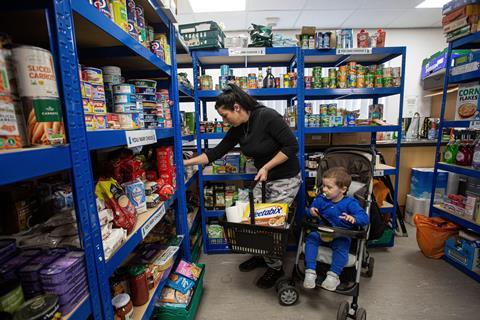Dawn Savidge looks at the most recent report on poverty from the Joseph Rowntree Foundation and suggests ideas for parents and the church.

You don’t have to look very hard to see that the majority of people in the UK are feeling the pinch of the cost-of-living crisis. Our money has to stretch further. Our jobs have become more unstable. The price of food has risen. We know that some people have to make a choice between heating and eating. But how bad is it really? What can we do as Christians to help alleviate some of the pressures from the families we might know. And how, as a Christian, can I survive in the middle of it all, living in a house with one income, three children and a high rent bill each month?
The Joseph Rowntree Foundation (JRF) has just published their annual poverty report, which gives us a picture of poverty in the UK. The picture is bleak and shows signs of deepening poverty (people already in poverty moving deeper into it). It is likely to stay the same if significant interventions are not made.
JRF talks about three types of poverty. First is relative income poverty where your income is less than 60% of the average national income for that year. A large proportion of people sit here. The average UK salary in 2024 was £37,712 per year. So, if your income was less than £22,500, you are classed as being in this category.
Then there is deep poverty. This is where your income is less than 40% - 50% of the average income in the UK (so about £15-18,000 per year). This means you are unlikely to afford basic necessities like food and shelter.
Finally, there is destitution. This is extreme poverty where you are unable to meet your most basic physical needs of food, shelter, clothing, and warmth. This category is small, but it is growing.
The JRF report looked at poverty in all three of these areas. The conclusion is that 1 in 5 people are living in one of these three states of poverty in the UK. That’s 14.3 million people, including 3 in 10 of all children. 4 in 10 of those people are living in deep poverty with 3.8 million people experiencing destitution.
Some might say: “why don’t these people get a job?” but it’s not always that easy, with low wage rates, zero hours contracts, benefit freezes, a two-child cap, an increase in solo parenting, the instability of the job market and high housing and energy costs all having a negative impact on household budgets.
So, what can we do?
Firstly, we must pray for the leaders of our nation. Whether we agree with their politics or not, we are called to pray for them (1 Timothy 2:1-4). The Government is currently working on a policy paper which looks at developing strategies to tackle child poverty. Pray for this. If you have the time and energy, then get involved, write to your MP and join a campaigning group (for example the Child Poverty Action Group).
Secondly, we can open our churches to help provide for the needs of the people in our communities. Many churches run CAP centres, warm spaces, Messy Church, community cafes, Community Groceries and food banks; making sure people are fed spiritually and physically. But that support can be broadened to running homework clubs to give children a safe and warm space to grow academically outside of school. Churches can become delivery partners to the Department of Work and Pensions, to provide job clubs and work coach spaces in a place that is more friendly and less daunting than a government building. The church can become a space that is needed by society for connection and growth.
What about if you are struggling to make ends meet?
When the sound of the ticking electric and gas meters gives you anxiety. When your children all share a bed with you so that you can all keep warm at night? When you can’t afford a prescription for yourself, or sanitary products, and you only eat once a day, what happens then?
My first piece of advice would be to make sure you are claiming everything that you are entitled to. There are some great websites that you can have a look at ( for examplke, Entitled To), as well as talking to your local council. £22.7 billion a year is the total amount of unclaimed benefits in the UK. Asking for help is not admitting defeat. You are not losing at life; just hitting a hard bump in the road.
Pray for wisdom and peace. God knows what you are going through and he promises to provide (Matthew 6:26). I once heard a testimony of a little girl and her sister. An elderly neighbour took them to church when they were small and they asked Jesus to be their friends. One day when they had totally run out of money, egged on by their unbelieving mother, they sat on the doorstep of their house and prayed that God would bring them food. At the ages of 7 and 9, their faith in Jesus was that he would provide. A short while later, a man turned up with some money so that they could buy food. The result was not only full cupboards, but their mum started going to church, and her sisters, and the whole family was saved as the result of two little girls faith that God would provide.
Be creative. This might mean food shopping only in the reduced section of the supermarket, using a food bank or Community Grocery, and getting creative in the kitchen. You can still have fun and adventure as a family but budget well for this. A picnic costs very little. A walk around the neighbourhood searching for animals and plants costs nothing but time. A game played together as a family is free and builds memories.
Finally, try and stay positive. Living in poverty is traumatic. As parents we are called to lead our children well, and that means often shielding them from traumatic events such as this. For one mum that might mean playing a game of dragon’s breath as you all wake in a freezing house. It might mean smiling through the pain when all we want to do is stop trying. It will mean praying for wisdom and opportunity.
Living in these times is hard. But as we look to God, pray for our leaders, reach out as communities and become stronger parents, we will see better days.




































